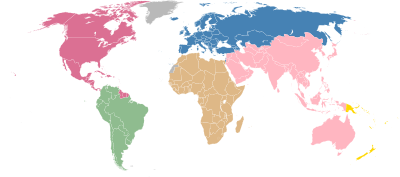UEFA Euro 2008
| UEFA Euro 2008 | |
| Fußball-Europameisterschaft 2008 (German) Championnat d'Europe de football 2008 (French) Campionato europeo di calcio 2008 (Italian) Campiunadi d'Europa da ballape 2008 (Romansh) |
|
| Tournament details | |
| Host countries | |
| Teams | 16 |
| Venue(s) | 8 (in 8 host cities) |
| Final positions | |
| Champions |
|
| Runners-up |
|
| Third place |
|
| Tournament statistics | |
| Matches played | 31 |
| Goals scored | 77 (2.48 per match) |
| Attendance | 1,140,902 (36,803 per match) |
| Top scorer(s) | |
| Best player | |
The 2008 UEFA European Football Championship, commonly referred to as Euro 2008, was the 13th UEFA European Football Championship, a quadrennial football tournament contested by European nations. The tournament, which was hosted by Austria and Switzerland, began on 7 June 2008, and concluded with the final at Ernst Happel Stadion in Vienna on 29 June 2008. The second jointly-hosted edition in the competition's history, the tournament was eventually won by Spain, defeating Germany 1–0 in the final; becoming only the second nation to win all their group stage fixtures and win the European Championship itself—a milestone also achieved by France in 1984. Spain were also the first team since Germany in 1996 to win the tournament undefeated.
Greece were the defending champions going into the tournament, having won UEFA Euro 2004, the previous edition of the competition. However, they recorded amongst the worst finishes in Euro 2008, collecting the least amount of prize money and gaining no points in their only three group fixtures. Throughout 31 matches, the participating nations totalled 77 goals, the same as the previous tournament. Austria and Switzerland automatically qualified as hosts; the remaining 14 teams were determined through qualifying matches, which began in August 2006. As European champions, Spain earned the right to compete for the 2009 FIFA Confederations Cup in South Africa.[1]
Contents |
Summary

Qualification for Euro 2008 started in August 2006, just over a month after the end of the 2006 FIFA World Cup. The qualifying tournament was contested by national teams from each of UEFA's member associations, with the exceptions of Austria and Switzerland, who had automatically qualified for the finals tournament as hosts, and Montenegro, who came into existence too late to be admitted to UEFA. England was the only seeded team not to qualify for the tournament proper, whereas Russia was the only unseeded one to qualify.
The draw for the finals tournament took place on 2 December 2007, and saw Group C immediately labelled as the "group of death", with Italy, France, Romania and the Netherlands competing for the two qualifying places. In contrast, Germany and Portugal were deemed to have an easy draw, as the tournament structure meant they could not meet Italy, France, the Netherlands or Spain until the final.
In the group stage, Croatia, Spain and the Netherlands all qualified with maximum points. Austria and Switzerland were not expected to progress, despite the advantage of being the hosts. In Group A, the Swiss lost their captain, Alexander Frei, to injury in their first game and became the first team to be eliminated from the tournament, after losing their first two matches. Austria fared slightly better in Group B, managing to set up a decisive final game against Germany, dubbed "Austria's final". However, they lost by one goal, making Euro 2008 the first European Championship not to have one of the host nations present in the knockout stage. In an exciting final game in Group A, an injury- and suspension-hit Turkey came back from 2–0 down to beat the Czech Republic 3–2, after an uncharacteristic handling mistake by Petr Čech, in the last few minutes, left Nihat Kahveci with the simplest of finishes. In the same game, goalkeeper Volkan Demirel was shown a red card for pushing Czech striker Jan Koller to the ground. The Turks joined Portugal as the qualifiers from Group A. France were the high-profile victims of Group C, recording just one point from a goalless draw against Romania in their opening game. Italy beat the French, on the final day, to finish on four points and joining the Netherlands in the quarter-finals. Finally, in Group D, Greece failed to reproduce the form of their shock 2004 win, and ended the tournament with no points. Russia qualified at the expense of Sweden, after beating them in a final game decider, joining Spain in the knockout stage.
In the quarter-finals, the Portuguese team was unable to give their coach, Luiz Felipe Scolari, a fitting send-off – following the mid-tournament announcement that Scolari would be leaving to join English club Chelsea – losing in an exciting game against Germany. Turkey continued their streak of last-gasp wins, equalising at the end of extra-time against Croatia and advancing on penalties. Coached by Dutchman Guus Hiddink, Russia eliminated the Netherlands with two extra-time goals. The last quarter-final match saw Spain defeat Italy on penalties, after a goalless draw in regular time.
Turkey's progress was halted by Germany at the semi-final stage. Turkey entered the game with nine of their squad members missing due to injury or suspension, but still scored the first goal. Later, they leveled the score at 2–2, before Germany scored the winning goal in the final minute. The world television feed of the match was intermittently lost during the match, which prevented the broadcast of Germany's second goal. This was due to a thunderstorm at the broadcasting relay station in Austria, despite the game being played in Switzerland. Spain won the second semi-final against Russia by three goals to nil, through second-half goals from Xavi, Dani Güiza and David Silva, earning Spain their first appearance in a major final for 24 years.

In the final, held at Vienna's Ernst-Happel-Stadion, Spain became European champions for the second time after Fernando Torres' first-half goal proved enough to defeat Germany. Though Germany had a strong start, Spain started to look more dangerous after they had settled. After half an hour, Xavi played a pass in behind the Germany back line towards Torres, who outmuscled a hesitant Philipp Lahm and clipped the ball over the diving Jens Lehmann and just inside the far post. That goal proved to be the only goal of the game which Spain dominated, despite Germany having the majority of the possession,[2] and Spain were crowned UEFA Euro 2008 champions.
Bid process
Austria and Switzerland jointly bid to host the games, and faced major competition from Greece/Turkey, Scotland/Republic of Ireland, Russia, Hungary, Croatia/Bosnia-Herzegovina and a 4-way Nordic bid from Norway/Sweden/Denmark/Finland. Austria had previously bid to host Euro 2004 with Hungary, but they eventually lost out to Portugal.
Austria/Switzerland, Greece/Turkey, and Hungary were recommended before the final vote. Greece and Turkey were rejected and let Hungary and Austria/Switzerland battle for the win.
The Austria/Switzerland bid is the second successful joint bid in the competition's history, following the UEFA Euro 2000 hosted by Belgium and the Netherlands. The 2012 competition in Poland and Ukraine is scheduled to become the third jointly-hosted tournament.
Venues
The tournament was played at eight venues throughout the two host nations; four in Austria and four in Switzerland. Each venue had a capacity of at least 30,000 for the tournament; the largest stadium was Ernst Happel Stadion in Vienna with a capacity of 53,295.[3] It was for this reason that Ernst Happel Stadion hosted the final. Switzerland played all of their group stage matches at St. Jakob Park in Basel, which also hosted the opening match of the tournament as a compromise for the final being held in Vienna. Austria played all of their group stage matches at Ernst Happel Stadion.
In 2004, the Zürich venue became a problem for the organisers. Originally, the Hardturm stadium was to be renovated and used as the city's venue, but legal challenges delayed the plan to a point that would not have allowed the ground to be used in 2008. This created a problem, as the agreement between UEFA and the organizers stipulated that four venues would be used in each country. The problem was solved when the organizers proposed renovating Letzigrund instead; UEFA approved the revised plan in January 2005. The Letzigrund stadium hosted its first football match on 23 September 2007.[4]
| Vienna | Klagenfurt | Salzburg | Innsbruck |
|---|---|---|---|
| Ernst-Happel-Stadion Capacity: 53,295 |
Hypo-Arena Capacity: 31,957 |
Wals-Siezenheim-Stadion Capacity: 31,020 |
Tivoli Neu Capacity: 31,600 |
 |
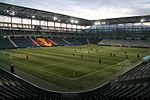 |
||
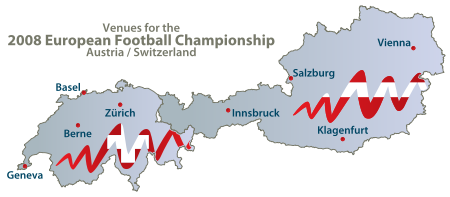 |
|||
| Basel | Berne | Geneva | Zürich |
| St. Jakob-Park Capacity: 42,000 |
Stade de Suisse Capacity: 31,907 |
Stade de Genève Capacity: 31,228 |
Letzigrund Capacity: 30,000 |
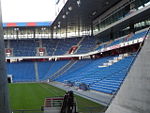 |
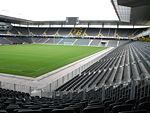 |
 |
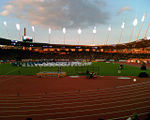 |
Qualifying
The draw for the qualifying round took place in Montreux, Switzerland on 27 January 2006 at 12:00 CET.
The qualifying process commenced a month after the 2006 World Cup. Austria and Switzerland automatically qualified for the tournament finals as host nations.
The qualifying format was changed compared to previous tournaments. The winners and runners-up from seven groups automatically qualified for the Championship, with the hosts filling the other two slots in the 16-team tournament. The change means there were no play-offs between teams finishing in second place in the groups – they qualified directly for the finals. Teams that finished in third place didn't have any further opportunity to qualify. Six of the qualifying groups contained seven teams, and the other, Group A, contained eight.
Qualified teams
| Country | Qualified as | Date qualification was secured | Previous appearances in tournament1 |
|---|---|---|---|
| Co-hosts | 12 December 2002 | 0 (debut) | |
| Co-hosts | 12 December 2002 | 2 (1996, 2004) | |
| Group A winner | 17 November 2007 | 0 (debut) | |
| Group A runner-up | 21 November 2007 | 4 (1984, 1996, 2000, 2004) | |
| Group B winner | 17 November 2007 | 6 (1968, 1980, 1988, 1996, 2000, 2004) | |
| Group B runner-up | 17 November 2007 | 6 (1960, 1984, 1992, 1996, 2000, 2004) | |
| Group C winner | 17 October 2007 | 2 (1980, 2004) | |
| Group C runner-up | 21 November 2007 | 2 (1996, 2000) | |
| Group D winner | 17 October 2007 | 6 (19602, 19762, 19802, 1996, 2000, 2004) | |
| Group D runner-up | 13 October 2007 | 9 (19723, 19763, 19803, 19843, 19883, 1992, 1996, 2000, 2004) | |
| Group E winner | 17 November 2007 | 2 (1996, 2004) | |
| Group E runner-up | 21 November 2007 | 8 (19604, 19644, 19684, 19724, 19884, 19925, 1996, 2004) | |
| Group F winner | 17 November 2007 | 7 (1964, 1980, 1984, 1988, 1996, 2000, 2004) | |
| Group F runner-up | 21 November 2007 | 3 (1992, 2000, 2004) | |
| Group G winner | 17 October 2007 | 3 (1984, 1996, 2000) | |
| Group G runner-up | 17 November 2007 | 7 (1976, 1980, 1988, 1992, 1996, 2000, 2004) |
-
1 Bold indicates champion for that year
-
2 as Czechoslovakia
-
3 as West Germany
-
4 as Soviet Union
-
5 as Commonwealth of Independent States
Seeding
The draw for the final tournament took place on 2 December 2007 at the Culture and Convention Centre in Lucerne.[5]
In a return to the format used at Euro 92 and Euro 96 the games in each group were held at just two stadia, with the seeded team remaining in the same city for all three matches. As was the case at the 2000 and 2004 finals, the finalists were divided into four seeding pots, based on average points per game in the qualifying phases of the 2006 FIFA World Cup and Euro 2008, with each group having one team from each pot. Switzerland and Austria, as co-hosts, and Greece, as defending champions, were seeded first automatically.[6][7] The Netherlands were seeded based on their UEFA coefficient in the Euro 2008 finalists ranking.
| Pot 1 | Pot 2 | Pot 3 | Pot 4 |
|---|---|---|---|
|
Match officials
Twelve referees and twenty four assistants were selected for the tournament:[8]
| Football Association |
Referee | Assistants | |
|---|---|---|---|
| Konrad Plautz | Egon Bereuter | Markus Mayr | |
| Frank de Bleeckere | Peter Hermans | Alex Verstraeten | |
| Howard Webb | Darren Cann | Mike Mullarkey | |
| Herbert Fandel | Carsten Kadach | Volker Wezel | |
| Kyros Vassaras | Dimitiris Bozartzidis | Dimitiris Saraidaris | |
| Roberto Rosetti | Alessandro Griselli | Paolo Calcagno | |
| Pieter Vink | Adriaan Inia | Hans ten Hoove | |
| Tom Henning Øvrebø | Geir Åge Holen | Jan Petter Randen[9] | |
| Ľuboš Micheľ | Roman Slyško | Martin Balko | |
| Manuel Mejuto González | Juan Carlos Yuste Jiménez | Jesús Calvo Guadamuro | |
| Peter Fröjdfeldt | Stefan Wittberg | Henrik Andren | |
| Massimo Busacca | Matthias Arnet | Stephane Cuhat | |
Squads
Each nation had to submit a squad of 23 players, three of which had to be goalkeepers, by 28 May 2008. If a player was injured seriously enough to prevent him from taking part in the tournament before his team's first match, he could be replaced by another player.[10]
Results
Group stage
Tie-breaking criteria
For the three game group stage of this tournament, where two or more teams in a group tied on an equal number of points, the finishing positions were determined by the record of the tied teams in the games they played against each other in the first instance, then the goals scored and goal difference in all group matches. There was a facility for positions to be determined by a penalty shoot-out if their records were identical and their last match was a draw against each other, but this situation did not arise. Pre-tournament records, disciplinary history and the drawing of lots were also available, but unused, grounds for determining positions.[11]
Group A
| Team | Pld | W | D | L | GF | GA | GD | Pts |
|---|---|---|---|---|---|---|---|---|
| 3 | 2 | 0 | 1 | 5 | 3 | +2 | 6 | |
| 3 | 2 | 0 | 1 | 5 | 5 | 0 | 6 | |
| 3 | 1 | 0 | 2 | 4 | 6 | −2 | 3 | |
| 3 | 1 | 0 | 2 | 3 | 3 | 0 | 3 |
| 7 June 2008 | ||
| Switzerland |
0 – 1 | |
| Portugal |
2 – 0 | |
| 11 June 2008 | ||
| Czech Republic |
1 – 3 | |
| Switzerland |
1 – 2 | |
| 15 June 2008 | ||
| Switzerland |
2 – 0 | |
| Turkey |
3 – 2 |
- Notes on the tie-breaking situation
- Portugal and Turkey are ranked by their head-to-head records
- Czech Republic and Switzerland are ranked by their head-to-head records
Group B
| Team | Pld | W | D | L | GF | GA | GD | Pts |
|---|---|---|---|---|---|---|---|---|
| 3 | 3 | 0 | 0 | 4 | 1 | +3 | 9 | |
| 3 | 2 | 0 | 1 | 4 | 2 | +2 | 6 | |
| 3 | 0 | 1 | 2 | 1 | 3 | −2 | 1 | |
| 3 | 0 | 1 | 2 | 1 | 4 | −3 | 1 |
| 8 June 2008 | ||
| Austria |
0 – 1 | |
| Germany |
2 – 0 | |
| 12 June 2008 | ||
| Croatia |
2 – 1 | |
| Austria |
1 – 1 | |
| 16 June 2008 | ||
| Poland |
0 – 1 | |
| Austria |
0 – 1 |
- Notes on the tie-breaking situation
- Austria and Poland are ranked by goal difference in all of their group games as their head-to-head records are identical.
Group C
| Team | Pld | W | D | L | GF | GA | GD | Pts |
|---|---|---|---|---|---|---|---|---|
| 3 | 3 | 0 | 0 | 9 | 1 | +8 | 9 | |
| 3 | 1 | 1 | 1 | 3 | 4 | −1 | 4 | |
| 3 | 0 | 2 | 1 | 1 | 3 | −2 | 2 | |
| 3 | 0 | 1 | 2 | 1 | 6 | −5 | 1 |
| 9 June 2008 | ||
| Romania |
0 – 0 | |
| Netherlands |
3 – 0 | |
| 13 June 2008 | ||
| Italy |
1 – 1 | |
| Netherlands |
4 – 1 | |
| 17 June 2008 | ||
| Netherlands |
2 – 0 | |
| France |
0 – 2 |
Group D
| Team | Pld | W | D | L | GF | GA | GD | Pts |
|---|---|---|---|---|---|---|---|---|
| 3 | 3 | 0 | 0 | 8 | 3 | +5 | 9 | |
| 3 | 2 | 0 | 1 | 4 | 4 | 0 | 6 | |
| 3 | 1 | 0 | 2 | 3 | 4 | −1 | 3 | |
| 3 | 0 | 0 | 3 | 1 | 5 | −4 | 0 |
| 10 June 2008 | ||
| Spain |
4 – 1 | |
| Greece |
0 – 2 | |
| 14 June 2008 | ||
| Sweden |
1 – 2 | |
| Greece |
0 – 1 | |
| 18 June 2008 | ||
| Greece |
1 – 2 | |
| Russia |
2 – 0 |
Knockout stage

The knockout stage was different from that of past tournaments. Teams in groups A and B were separated from teams in groups C and D until the final. This increased the chance of a group fixture being replayed in the knockout stage, and rendered impossible a final between two teams drawn in the same half of the tournament. Also, in another major change, for the first time in a European Championship, only two venues (St. Jakob-Park, Basel and Ernst Happel Stadion, Vienna—the two largest of the eight stadiums used) were used for the seven matches in the knockout stage of the tournament.[12]
| Quarter-finals | Semi-finals | Final | ||||||||
| 19 June - Basel | ||||||||||
| |
2 | |||||||||
| 25 June - Basel | ||||||||||
| |
3 | |||||||||
| |
3 | |||||||||
| 20 June - Vienna | ||||||||||
| |
2 | |||||||||
| |
1 (1) | |||||||||
| 29 June - Vienna | ||||||||||
| |
1 (3) | |||||||||
| |
0 | |||||||||
| 21 June - Basel | ||||||||||
| |
1 | |||||||||
| |
1 | |||||||||
| 26 June - Vienna | ||||||||||
| |
3 | |||||||||
| |
0 | |||||||||
| 22 June - Vienna | ||||||||||
| |
3 | |||||||||
| |
0 (4) | |||||||||
| |
0 (2) | |||||||||
All times are Central European Summer Time (UTC+2)
Quarter-finals
| 19 June 2008 20:45 |
Portugal |
2 – 3 | St. Jakob-Park, Basel Attendance: 39,374 Referee: Peter Fröjdfeldt (Sweden) |
|
| Nuno Gomes Hélder Postiga |
(Report) | Bastian Schweinsteiger Miroslav Klose Michael Ballack |
| 20 June 2008 20:45 |
Croatia |
1 – 1 (a.e.t.) | Ernst Happel Stadion, Vienna Attendance: 51,428 Referee: Roberto Rosetti (Italy) |
|
| Ivan Klasnić |
(Report) | Semih Şentürk |
| Penalties | |||
| Luka Modrić Darijo Srna Ivan Rakitić Mladen Petrić |
1 – 3 |
| 21 June 2008 20:45 |
Netherlands |
1 – 3 (a.e.t.) | St. Jakob-Park, Basel Attendance: 38,374 Referee: Ľuboš Micheľ (Slovakia) |
|
| Ruud van Nistelrooy |
(Report) | Roman Pavlyuchenko Dmitri Torbinski Andrei Arshavin |
| 22 June 2008 20:45 |
Spain |
0 – 0 (a.e.t.) | Ernst Happel Stadion, Vienna Attendance: 48,000 Referee: Herbert Fandel (Germany) |
|
| (Report) |
| Penalties | |||
| David Villa Santi Cazorla Marcos Senna Dani Güiza Cesc Fàbregas |
4 – 2 |
Semi-finals
| 25 June 2008 20:45 |
Germany |
3 – 2 | St. Jakob-Park, Basel Attendance: 39,374 Referee: Massimo Busacca (Switzerland) |
|
| Bastian Schweinsteiger Miroslav Klose Philipp Lahm |
(Report) | Uğur Boral Semih Şentürk |
| 26 June 2008 20:45 |
Russia |
0 – 3 | Ernst Happel Stadion, Vienna Attendance: 51,428 Referee: Frank de Bleeckere (Belgium) |
|
| (Report) | Xavi Dani Güiza David Silva |
Final
| 29 June 2008 20:45 |
Germany |
0 – 1 | Ernst Happel Stadion, Vienna Attendance: 51,428 Referee: Roberto Rosetti (Italy) |
|
| (Report) | Fernando Torres |
| UEFA Euro 2008 Winners |
|---|
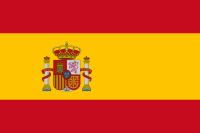 Spain Second title |
Statistics
Goalscorers
|
|
|
Awards

The UEFA Technical Team was charged with naming a squad comprised of the 23 best players over the course of the tournament. The group of nine analysts watched every game at the tournament before making their decision after the final. Nine players from the winning Spanish team were named in the team of the tournament, while no players knocked out in the group stage were included.[13] The UEFA Technical Team also had to pick a Player of the Tournament, taking fans' votes into account. The player chosen was Spain midfielder Xavi.[14] The Golden Boot was awarded to yet another Spaniard, David Villa, who scored four goals, three of which came in his side's 4–1 win over Russia (the only hat-trick scored in the tournament).[15]
- UEFA Team of the Tournament
| Goalkeepers | Defenders | Midfielders | Forwards |
- Golden Boot
 David Villa (4 goals)
David Villa (4 goals)
- UEFA Player of the Tournament
Discipline
At UEFA Euro 2008, players may be suspended from playing in subsequent matches upon the collection of a certain number of yellow or red cards. If a player is shown a red card – whether as a result of two bookable offences or a straight red – that player is suspended from playing in his team's next match. If his team is eliminated from the competition before the end of his suspension, the games carry over to the 2010 FIFA World Cup qualification matches. A player is also suspended for one match for picking up two yellow cards in separate matches. However, any yellow cards accumulated are annulled once a team is eliminated from the tournament or reaches the semi-finals.[16]
In extreme cases of ill-discipline, UEFA may choose to have a disciplinary panel examine the incident in order to determine whether or not further suspension is required. One case of this at Euro 2008 was the suspension of Turkey goalkeeper Volkan Demirel for two matches for pushing Czech striker Jan Koller.[17]
The following players were suspended for one or more games as a result of red cards or yellow card accumulation:
| Player | Offence(s) | Suspension(s) | Notes |
|---|---|---|---|
| Group D v Spain Group D v Greece |
Suspension due to red card in last game of qualifying Group E |
||
| Group B v Austria | |||
| Group B v Germany | |||
| Group C v Netherlands | |||
| Quarter-final v Croatia | |||
| Quarter-final v Croatia Semi-final v Germany |
Suspension increased to two games for serious violent conduct |
||
| World Cup qualifying v Austria | Suspension to be served in World Cup qualifying Group 7 |
||
| Quarter-final v Spain | |||
| Quarter-final v Spain | |||
| Semi-final v Germany | |||
| Semi-final v Germany | |||
| Semi-final v Germany | |||
| Semi-final v Spain | |||
| Semi-final v Spain |
Miscellany
Television coverage failure
Three times in the second half of the semi-final between Germany and Turkey, nearly the entire global television coverage of the game was interrupted. A thunderstorm over Vienna caused technical difficulties in the International Broadcast Centre (IBC), which relayed the television feed from the match in Basel, Switzerland, resulting in one or more goals being missed by various audiences.[18] Various national broadcasters took emergency contingency measures such as reverting to radio broadcasting (for example, the BBC used coverage from Radio 5 Live).[19] Only the Swiss public broadcaster SRG maintained full coverage since it used a direct signal other than the IBC's.[20]
New trophy
A new trophy was awarded to the winners of the Euro 2008 tournament. The new version of the Henri Delaunay Trophy, created by Asprey London,[21] is almost an exact replica of the original designed by Arthus-Bertrand. A small figure juggling a ball on the back of the original has been removed, as has the marble plinth. The silver base of the trophy also had to be enlarged to make it stable. The names of the winning countries that had appeared on the plinth have now been engraved on the back of the trophy, which is made of sterling silver, weighs 8 kilograms (17.6 lb) and is 60 centimetres (24 in) tall.
Penalty kicks
Not counting penalty shoot-outs, there were only four penalty kicks awarded during the tournament, comfortably the lowest such total for a 16-team European Championship. For the first time since tournament expansion for Euro 96, no penalties were awarded during the knockout stage. Romanian Adrian Mutu provided the sole penalty miss, late in the match against world champions Italy; had he scored and Romania held on for the win, the Italians would have been knocked out. Curiously, the penalties scored were all taken by midfielders, whereas the one miss was taken by a forward.
- Converted
- Luka Modrić for
 Croatia v
Croatia v  Austria
Austria - Ivica Vastić for
 Austria v
Austria v  Poland
Poland - Andrea Pirlo for
 Italy v
Italy v  France
France
- Missed
- Adrian Mutu for
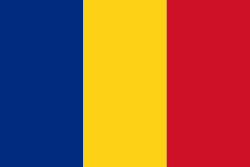 Romania v
Romania v  Italy, saved by Gianluigi Buffon
Italy, saved by Gianluigi Buffon
Match ball
The match ball for the finals was unveiled at the draw ceremony. Produced by Adidas and named the Europass, it is a 14-panel ball in the same construction as the Teamgeist, but with a modified surface design.[22] A version named the Europass Gloria was used in the final.[23]
There were concerns raised about the match ball, which was claimed to deviate unpredictably in flight, making it difficult to judge for goalkeepers. Notable players to criticise were Germany's Jens Lehmann and the Czech Republic's Petr Čech.[24] These claims were disputed by the ball's designer, Oliver Kahn.
Music
The official melody was composed by Rollo Armstrong of Faithless on behalf of UEFA.[25]
The official Euro 2008 song was "Can You Hear Me" by Enrique Iglesias, which was performed live during the official closing ceremony prior to the final in Ernst Happel Stadion in Vienna on 29 June.[26]
As well as the official song, two soundtracks, "Like a Superstar" and "Feel the Rush", were recorded by Jamaican reggae artist Shaggy as mascot songs for Euro 2008. They formed a musical background to video clips featuring the twin mascots Trix and Flix.[25]
The official Swiss song for the tournament was a new version of "Bring en hei" by Baschi,[27] Christina Stürmer sings the official tournament song of Austrian ÖFB, "Fieber" (Fever).[28] Croatia manager, Slaven Bilić has recorded his country's official Euro 2008 song, "Vatreno ludilo" ("Fiery Madness"), with his rock group, Rawbau.
"Seven Nation Army" by The White Stripes was played when players walked out before kick-off.[29] A remix of "Samba de Janeiro" by German dance group Bellini is played after each goal scored in the competition.[30]
Mascots

- See also: UEFA European Football Championship mascot
The two official mascots for UEFA Euro 2008, were named after a vote from the public of the two host nations from the following options:
- Zigi and Zagi
- Flitz and Bitz
- Trix and Flix
After receiving 36.3% of the vote, Trix and Flix were chosen. "I am sure the mascots and their names will become a vital part of the understanding of the whole event," said Christian Mutschler, who is the tournament director for Switzerland.[31]
Slogan
The slogan for UEFA Euro 2008 was chosen on 24 January 2007: Expect Emotions.
The UEFA President Michel Platini stated "It describes in a nutshell what the UEFA Euro 2008 has to offer: all kinds of emotions – joy, disappointment, relief or high tension – right up to the final whistle."[32]
Commemorative coins
To celebrate this occasion, some countries in Europe issued special commemorative coins. Among them were the Austrian €5 2008 European championship commemorative coins (two coins). One coin shows players dribbling, while the other coin shows a striker trying to reach the ball. In the pieces, all eight venues of the 2008 finals, are depicted.
Prize money
UEFA announced that total of €184 million has been offered to the 16 teams competing in this tournament, increasing from €129 million in the previous tournament. The distributions as below:[33]
- Prize for participating: €7.5 million
Extra payment based on teams performances:
- Winner: €7.5 million
- Runner-up: €4.5 million
- Semi-finals: €3 million
- Quarter-finals: €2 million
- Group stage (per match):
- Win: €1 million
- Draw: €500,000
Spain, as winners of the tournament and winners of all three of their group stage matches, received a total prize of €23 million, the maximum possible prize money. Greece on the other hand, being the only team to lose all three of their group matches, were the only team to receive nothing more than the €7.5 million participation prize.
Broadcasting rights
Many of the world's national broadcasters have secured broadcasting rights of the tournament, as of 16 January 2008.[34]
References
- ↑ Spain will not be obliged to participate in the Confederations Cup. Prior to 2004, the European and South American champions were obliged to participate in the Confederations Cup, but a FIFA ruling changed this in 2004.
"2005/2006 season: final worldwide matchday to be 14 May 2006". FIFA.com (19 December 2004). Retrieved on 14 June 2008. - ↑ "Match statistics". euro2008.uefa.com (29 June 2008). Retrieved on 30 June 2008.
- ↑ "UEFA EURO 2008". fussballtempel.net. Retrieved on 8 June 2008.
- ↑ "Zurich - Letzigrund Stadion".
- ↑ "Draw sets up heavyweight contests", uefa.com (2 December 2007). Retrieved on 2 December 2007.
- ↑ "Format from UEFA Website".
- ↑ "UEFA Euro 2008 Information" (PDF).
- ↑ "UEFA Euro 2008 referees".
- ↑ "Hundredeler for treig til EM-plass" (in Norwegian), Dagbladet (17 April 2008). Retrieved on 30 June 2008.
- ↑ "Regulations of the UEFA European Football Championship 2006/08" (PDF).
- ↑ Paragraph 7.08 (Section V) of Regulations of the UEFA European Football Championship, 2006/08
- ↑ "Euro-Format means group rivals cannot meet again in final", Yahoo! Sports (3 June 2008). Retrieved on 3 June 2008.
- ↑ "Spain dominate Team of the Tournament", euro2008.uefa.com (30 June 2008). Retrieved on 30 June 2008.
- ↑ "Xavi emerges as EURO's top man", euro2008.uefa.com (30 June 2008). Retrieved on 30 June 2008.
- ↑ "Absent Villa takes scoring prize", euro2008.uefa.com (29 June 2008). Retrieved on 1 July 2008.
- ↑ "Directives on yellow cards in the EURO 2008 competition". UEFA (11 July 2006). Retrieved on 20 June 2008.
- ↑ "Volkan Demirel banned", euro2008.uefa.com (19 June 2008). Retrieved on 20 June 2008.
- ↑ "Uefa may face action over outage", BBC News (25 June 2008). Retrieved on 26 June 2008.
- ↑ "Euro 2008 semi-final thriller hit by TV blackouts", guardian.co.uk. Retrieved on 26 June 2008.
- ↑ Pfanner, Eric (26 June 2008). "Euro broadcasters scramble in storm", International Herald Tribune. Retrieved on 27 June 2008.
- ↑ "New trophy announced at UEFA site".
- ↑ "adidas "EUROPASS" – the match ball with "goose bumps" for UEFA EURO 2008", adidas (2 December 2007). Retrieved on 4 December 2007.
- ↑ "Final ball rolled out in Vienna", euro2008.uefa.com (30 April 2008). Retrieved on 30 May 2008.
- ↑ "Cech concerned by Euro 2008 ball", BBC Sport (6 June 2008). Retrieved on 6 June 2008.
- ↑ 25.0 25.1 "The official UEFA EURO 2008™ music". UEFA (28 February 2008).
- ↑ "Official UEFA EURO 2008™ Song: "Can You Hear Me" by Enrique Iglesias". UEFA (20 May 2008). Retrieved on 20 June 2008.
- ↑ Official UEFA EURO 2008 Song: "Can You Hear Me" by Enrique Iglesias
- ↑ Christina Stürmers offizieller EM-Song heißt "Fieber" on orf.at
- ↑ Seven Nation Army: the indiest football anthem ever?, The Guardian, 18 June 2008
- ↑ What's That Song They Play After the Euro Goals?, Euro 2008 Championships on World Cup Blog
- ↑ "Official Mascot Naming".
- ↑ "Expect Emotions at Euro 2008".
- ↑ "UEFA raises 2008 prize money".
- ↑ "UEFA Euro 2008 Broadcasting Rights" (PDF).
External links
|
UEFA Euro 2008 stages
|
||||||||||||||||||||||||||
|---|---|---|---|---|---|---|---|---|---|---|---|---|---|---|---|---|---|---|---|---|---|---|---|---|---|---|
|
||||||||||||||||||||||||||
| UEFA Euro 2008 general information | ||||||||||||||||||||||||||
|
||||||||||||||||||||||||||
|
UEFA Euro 2008 finalists
|
||||||||||||||||||||||||||
|
||||||||||||||||||||||||||
|
||||||||||||||||||||||||||
|
||||||||||||||||||||||||||
|
International football
|
||||||||||||||||||||||||||
|
||||||||||||||||||||||||||
|
||||||||||||||||||||||||||
